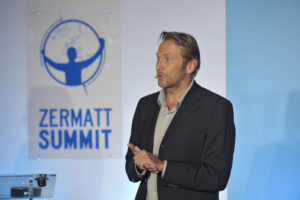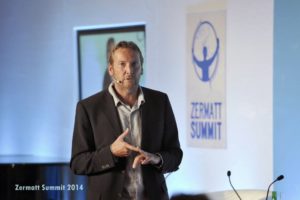Jochen Zeitz – The Courage to Redefine Business Purpose
Inspiring Testimony Talk by Jochen Zeitz, Cofounder & co-chair, The B-Team / Director, Kering / Founder, Zeitz Foundation. Jochen Zeitz is Director of Kering and Chairman of the board’s sustainable development committee and Co-Founder and Co-Chair of The B Team after having been the CEO of the Sport & Lifestyle division and Chief Sustainability Officer of Kering since 2010. Prior to this, Zeitz served 18 years as Chairman and CEO at PUMA. In 2008, he founded the Zeitz Foundation for Intercultural Ecosphere Safety to support sustainable solutions that balance conservation, community development, culture, and commerce. In October 2012, Zeitz co-founded The B Team with Sir Richard Branson to help transform the future of business.
Transcript verbatim
My journey (here) wasn’t quite a 24-hour journey but almost. I’ve just arrived from New York where we had some very exciting meetings that I’m going to talk about in a minute. In fact one is to do with Harley-Davidson another one with the B Team that Mr Wasserman just mentioned, but as I was asked to talk a little bit about my own experience of and my own courage of redefining the purpose of business, I think I need to rewind about 20 years.
My own purpose in business was actually to become a medical doctor because there was a long family tradition so, very early on I realised that breaking the traditional paradigm would become part of my career. I was the first to get into business not knowing anything about it and my parents used to say « We have no idea of what you’re doing – it sounds pretty good though ». So, after my initial studies I went to work in the United States.
I actually went as a 24 (year-old) to the US to work for an American corporation because I thought that in the traditional corporate world in Germany, as a 24 year old that I wouldn’t be given much responsibility. I joined Puma at the age of 27 and very early on I realised that redefining and breaking the traditional purpose of business once again was required in order to turn a company, that was truly on the verge of bankruptcy, into a profitable business again.
So here I was, and I guess the biggest courage was initially the courage of our shareholders at the time – to appoint a 29-year-old to become CEO of a public company in Germany that was nearly under receivership with eleven German banks managing it. For me, it wasn’t really courage – I was kind of naive, I guess, and I never asked the question « Why was it so unusual to put a 29-year-old in charge? ». But I put a team together of quite unusual business people in fact, my chief marketing officer was a skateboard rider, my chief financial officer used to work in the warehouse and then did a second degree in accounting, my chief or deputy as well as my chief product officer was a ski instructor, truck driver and later a salesman. so I had a very eclectic group of people that all wanted to change and challenge the traditional paradigm of doing business.
So, taking a company that was actually used to selling low-price shoes (because the son of the founder had decided that Puma was for the masses, and should be sold at $19 a pair of shoes), we first had to clear the inventory and say « Well, we are actually not about selling cheap shoes ». So, restructuring, re-engineering and all the things you have to do in order to reposition the brand we did, and we became, after nine straight years of losses in the first year, after the restructuring, a profitable company.
We repaid our hundred million dollar debt and we (have been) profitable ever since but we had also realised that we had to redefine the purpose of business, the purpose of the brand yet again – because, just selling decent performance shoes was really not taking us anywhere simply because there were bigger brands that were more powerful brands – (there were) others that were occupying that space so we sat together and came up with a plan that would refine the purpose of the brand and we decided that we would not just be a performant functional boring brand but become a brand that was cool and desirable. That was again when we broke the traditional paradigm and actually stopped looking at our research. Because, when we did our traditional research studies which I was used to at my previous company, Colgate Palmolive, we were told that Puma was a cheap brand – a brand that should never attempt to be fashionable nor should it ever try to sell to women ! So, we said forget that! – that’s not a good idea – we shouldn’t listen to our research because if we do that we’ll be stuck where we are. So, we threw that out and said, « We will become the coolest brand, we will become the most expensive brand we will become a fashionable brand and will become desirable again ».

We realised that the supply chain that we were using all the way throughout our factories was actually not a clean supply chain and that Puma is a brand that carries an animal in its logo, so wasn’t it a natural thing to also ask ourselves « Isn’t nature important to the brand?”. So, before CSR became a buzzword we decided that we have to clean up our act, we have to look at the standards in our factories, we have to look at the social standards but we also have to look, at the same time, at nature’s impact or the impact of our business on nature !
So, we started to clean up our act, became a responsible business until we felt that wasn’t good enough because responsibility is not really something that allows you to necessarily innovate or at least it doesn’t take an organisation forward in an innovative way. So, we decided, once again, to redefine the purpose of the brand to make it not just the most fashionable, cool and sporty brand but to actually make it also desirable from a sustainable perspective.
Yet again, (we were met with) big eyes! (from the) big businesses and usually when I encounter what I’d encountered in my business career was (that) when we had the path of the hardest and most resistance it was usually the right path (as so much of it is about) breaking the business paradigm, the traditional business paradigm. So, we said “Let’s innovate around sustainability, let’s not just look at it as a responsibility!”
So, what we did was, we refined our mission – we wanted to be the most desirable and sustainable sport lifestyle company and we created a new vision, a Puma vision of a better world, a better world that from our perspective was more peaceful, more safe as well as more creative and those three ingredients of being creative, innovative, allowed us to use the sustainability aspect to really change the way we were doing business. In almost no time we re-innovated the brand and put sustainability onto an innovative platform. We set tough targets for our business but we also set tough targets for our products, in terms of biodegradability in terms of sustainability recycling, in terms of nature’s impact and that’s when we just (as Mr. Wasserman mentioned) we came up with the idea of actually measuring our environmental footprint. I truly believe that what you don’t measure, you don’t really manage, and we are all looking at it as business people, at bottom lines and top lines and margins but what about nature what about society ?
Of course, one could say « Is that really ethical to put society and nature into metrics?”. Well, you could say it’s business ethical… why not ? If it helps us businessmen or women to actually innovate as we realise, while we are measuring our impact, we can start innovating and finding solutions to our negative impact! I truly believe it’s very worthwhile doing. So, the concept of the environmental profit and loss actually looks at environmental impacts such as land use, carbon use, or creation pollution, waste etc., and puts it into relation to each other and we realised after we innovated with the first environmental profit and loss that our annual footprint throughout the supply chain was 146 million Euros so, with over 300 million in profit, our supply chain alone was generating a loss for nature. And, if nature was a service and said, « You better pay me for the damage you do », we would have to pay, together with all of our supplies, 146 million annually!
Now, the same thing you can do (by) looking at societal impacts, that business as a positive (by) creating jobs but also a negative when you look at some of the standards with regard to your supply chain. So, I realised over time that after having been CEO for almost 20 years that my mission had now become a bigger one. So, after becoming a board member of Kiering, the company that had required Puma which owns wonderful brands such as Gucci, StellaMcCartney, Bottega Veneta, Solo and many others, we (decided we) should try and do the same thing in our mothership. Why not? – and so, we did.
Mr. Pino, who’s the the owner and majority shareholder with his family, Kiering – formerly known as PPR, signed up to the agenda. Yet again, (I was met with) big eyes because, imagine standing in front of CEOs of luxury brands that now think you are the “sustainable Taliban » as somebody once called me, trying to try to convince them that sustainability was actually an opportunity.
And that’s the key thing – it is an opportunity – you have to look at it as an opportunity because if you don’t you will not find the solutions to the massive problems we have. Business is part of the problem. I’d come to realise that over my years in business but business is also about solving problems so let’s solve problems and simply, what we did – we looked at luxury and said “Luxury is all about tradition, heritage, longevity, quality… well – there you go – that’s sustainable, isn’t it ?” “What is not sustainable is not good quality!”. And then everybody said, “That makes sense, we are better than the fast-moving brands we are all about craftsmanship history heritage we preserve »… and that is now something that every luxury brand can relate to. We’ve created a truly inspiring initiative with over 15 million Euros in annual contribution from the mothership in order to support sustainability initiatives throughout the various brands that are now collaborating to find sustainable solutions.
Then I became a board member of with Harley-Davidson. Now you could ask, « what am I doing here?” and of course Harley’s all about the sound and the smell of the Harley-Davidson isn’t it? So, I began became the Taliban again in a sustainable way. I decided to chair – actually create, a sustainability committee on the board which I am still chairing today – not just for Kiering and other companies, and we went about redefining the Harley-Davidson brand again and trying to translate sustainability into something that would truly be embraced by the hog owner. How did we do that ? Well, Harley Davidson is about preserving and renewing the Harley-Davidson ride, preservation, renewal. The Harley-Davidson brand went through a lot of history – 111 years of history now, good history, difficult history, turnarounds, innovation. And we said great! – that’s the basis everybody understands and what became first a big question mark turned into the solution.
So, one of the reasons why I was in New York was because we just, after five years of work, launched the first electric Harley Davidson. So that was a big one for me because to turn such a traditional brand into something that would see an electric Harley as an opportunity, knowing that the traditional hog owner is not necessarily the electric enthusiast, was a big one! But if you hear this bike and if you look at the bike it’s totally Harley and the PR value of just that message was probably worth 200 million dollars within three days. It completely revitalised the image and what was once a question mark of – ‘Can Harley attract the next generation?’ became ‘How can I get this bike, that’s the first Harley I want to have’.
So again, you turn sustainability into something which is desirable, which makes sense for your brand. It’s not just a buzzword out there that means little – you’re translating it into the DNA of what you’re doing in business and that’s what we’re trying to do with the other initiative which I just co-chaired with Sir Richard Branson yesterday which is called the B-Team and that’s maybe the last chapter in my sustainability journey that I’d like to talk about.
There won’t be much time to talk about my foundation (Zeits Foundation) – what I’m doing in Africa, – trying to make tourism sustainable at the same time – maybe I’ll leave that for another speech at another day but The B-Team is actually trying to change business for better and actually the « B” doesn’t stand for Branson – it stands for Better Business – I made sure because I came up with the name and what we said is, « Let’s bring individuals together that have already proven that we can change things through business inside out ».
So, we brought 16 business leaders together from Nobel Peace Prize laureates to Arianna Huffington in media, Muhammad Yunus, micro-finance, Paul Polman from Unilever, Richard, myself and many others from around the world – Mo Ibrahim from Africa and go see the Finance Minister of Nigeria and, and, and…. in order to really try and redefine the role and purpose of business so he again who now we are trying to take on traditional capitalism and try and redefine it and we believe that based on the experience each one has had in our individual business we know where we’ve made mistakes we know where we’ve done better, and we believe that we can collectively, together with others that will join the movement that we are starting to create, we’ll be able to have a contribution towards a better way of doing business. A way of doing business that is not just profitable from a financial point of view but also from a social and environmental point of view. So, the B-Team’s challenge is manifold as you can imagine and we’ve just defined the four-key challenge areas that we would like to take on, then I’d like to conclude my speech.
On the four challenges that we believe are key and where we believe we can actually impact business to become better, are the future bottom line – if we don’t measure, we can’t manage. So, redefining how we can actually manage and put metrics to the way we calculate in business is critical. So the future bottom line as to the triple bottom line that John Elkington, co-author of my new book which is coming out (a little bit of advertising) in August, (The Breakthrough Challenge) we believe that we have to start putting measurements and metrics towards the business so that we can all visualise, because not all of us had an epiphany, not all of us believe in this new way of thinking, not all of us meditate, not al lof us become missionaries, not all of us believe that business should change. But when we realise and measure our impact we will automatically start changing and we can filter down though our organisations that the future bottom line is one of the key challenges.
The future of incentive is another one because we believe that without incentivising business, it will be difficult. We have perverse subsidies in fossil fuels, we don’t have enough incentives for good products to be sold. If we look at import duties today, actually materials that are less sustainable are benefiting from lower import duties than the materials that are more sustainable. So, creating innovation just like subsidies towards solar the solar industry has started a whole new sector. We believe that incentivising business is critical hence, we want to work with governments in order to define what these incentives are.
So, rather than trying to say ‘we’ve got to get rid of perverse subsidies’ – which is a battle you may not win against those who are much more powerful and bigger and have more at stake monetary wise, and trying to take on the whole world, we say, ‘well why don’t we start with incentivisation ?’. So, incentivising business, it’s all… and that’s what the third challenge is, all it’s all coming down to leadership at the same time. I think all of us have experienced that without leadership, it isn’t going to happen so it’s important that we create that new leadership, that we get others to join to join a new thinking of a more sustainable business, of a better business that is more equitable in every respect; socially, environmentally and financially. It comes down to education, it comes down to gender equality, it comes down to empowering people, it comes down to new ways of doing business.
Social enterprise was something that we just discussed with Sir Cohen (Ronald Mourad Cohen – Father of Social Investment – Wikipedia) yesterday. Some say, ‘Well, it’s just a new way of philanthropy’ – well, it is not. In fact, you can put clear metrics behind social enterprise and actually prove that a lot of things that we are doing from an governmental and business point of view may actually be better off if you apply social enterprise metrics, and may become even as profitable as traditional ways of accounting.
So, the challenge of leadership is important and the challenge of investment – the future of investment as the four fourth key pillar of our attack. Investment because money flows are important. The way banks operate, the way we invest – we just touched on it, social enterprise being one example, – we have to also make sure that more money is getting invested into a new way of doing business and if you look at those four challenges together, we believe we can actually move the dial (back) step by step by redefining sustainable development goals on a global perspective as well as by working with business leaders around the world that are willing to join in this journey.
So, when it comes to courage it’s not really just about courage – courage it can be whatever you want. For me, it was never courage – I’m just a curious and adventurous guy, I like to change challenge the traditional Paragon and I will continue to do so until actually not until somebody tells me otherwise because they have always done that in my past thank you very much.
Christopher Wasserman asks about the Zeitz Foundation
Q&A Follows


